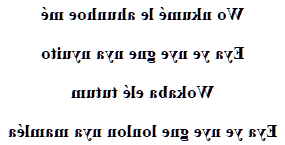Ewe love poem
Ahuhɔ̃e
Wo nkumé le ahunhoe mé
Eya ye nye gne nya nyuito
Wokaba elé tutum
Eya ye nye gne lonlon nya mamléa


→ French poem ←
Ewe language
Short Ewe love poem (Ewé, Éwé, Éoué, Évé, Eʋe, Eue, Awlan, Anglo, Anlo, Krepi, Hudu, Awuna, Efe, Aveno, Vo, Eibe, Gbe, Krepe, Eve, Kotafoa, Agu, Be, Togo, Popo, Ho, Ebwe, Ehwe, Adan, Vlin, Vhe, Kpelen, Gbin, autonym : Èʋegbe).
This vehicular language with 7.5 million speakers, is in the tonal language of a pretty Togolese. I dedicate it to all the girls of Lomé.
The ewe is a Nigerian-Congolese language of the kwa group, which is found in: Benin, Togo, Ivory Coast and Ghana. It is spoken by the Ewes and by many other ethnicities, on the southern coast of West Africa between the Volta River in Ghana and the Mono River in Togo. The word voodoo is of Ewe origin.
The separation of Ewe groups during their migration will create differences and variations in their language. Their meeting with Europeans, speaking different languages (English, French, German etc.) will also help to develop and modify the ewe.
The dialects of Ewe include three groups, those of the west, the east and the center (Watyi, Adya, Ge (Mina)), one can mention Kpele and Notsie in Togo, Waci in Benin, Anio, Tonu, Ho, Kpedze, Kpandu and Anfoe in Ghana. The language is taught at school and university in Togo and Ghana, both countries where it is a national language.
The Ewes
It is believed that the Ewe (Eʋe) originated from Ethiopia, then Sudan to go to present-day Yoruba country, in the Oyo region of the actual Nigeria.
In the 17th century, they migrated west, north-west and south, first to Kétu in Benin, then to Tado in Togo to join the Adja. Some will then go to Agbomé in Benin and still later to Ghana.
Of all these flights or movements, the Ewe will therefore settle in fertile plains, in the bush or in the forest.
They are farmers with as main crops: bli, àgbèli, àzi, kɔfi, tè, yèvunè, kôkô, ɖèti, àyi, màŋkàni, dèti... respectively: maize, cassava, peanuts, coffee, yam, coconut, cocoa, cotton, bean, taro, palm tree.
They are also hunters, breeders (goats and cattle), and excellent fishermen, whether at sea, on rivers or lakes.
Crafts and art as everywhere in Africa occupy a prominent place, it is inherent in their culture and participate in the rites and celebrations they organize.
Do not think that the Ewe society is folded in on itself, the Ewe have also long been excellent traders.
They are farmers and fishermen, their socio-political organization rested on exogamous patrilineages, the principle of virilocal residence and the unity of the city-state; The head of lineage played an important role as an intermediary with the ancestors, who were the object of a particular cult.
The chiefdoms, made up of members chosen for life, are the basis of their social organization. An assembly of chiefs, considered as wise men, administers their daily life around the Dùfià (supreme chief) and the Àsàfo (responsible for security), by discussing and enacting the laws which will allow the best balance of the community. The role of the Tsami is to relay the decisions of the chiefdoms to the community.
Among the Ewe the woman is not forgotten, so there is a kind of counterpart, defending women within this assembly of chiefs, and it is the Nyɔnufià who occupies this office.